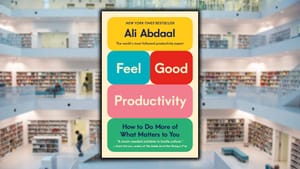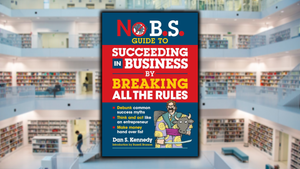
Summary:
I’ll make a deal with you: you read this book summary to the end, and I’ll teach you some of the most astonishing tactics I’ve learned from the former lead international kidnapping negotiator for the FBI, Chris Voss, for getting exactly what you want in the giant negotiation that is your life.
While we discuss this book, I want you to feel like you are being treated fairly at all times. So please stop me at any time if you feel I'm being unfair, and we'll address it (that’s one of the magical phrases you’ll learn, and Voss will teach you exactly why it works so tremendously.)
Alright, so that opening joke was funny for about two paragraphs, but seriously: you can get almost anything you want in life; you just have to learn how to ask correctly. That’s exactly what you’ll learn here, and how you’ll learn to think once you internalize some of the lessons from this book.
Negotiation is simply the art of letting someone have your way, and the days of threatening people with grievous physical harm, or trying to otherwise dominate them are over. Sophisticated negotiators don’t work like that anymore, relying as they do on empathy, active listening, and all that other stuff that doesn’t make for great TV, but that gets real hostages in the real world back to their real families with all their real parts intact.

Life is a negotiation - although of course you’d expect a former hostage negotiator to say that - and if you think about it, you’re engaging in small (and large) negotiations many times per day. You’re getting along - or not getting along - with roommates, you’re setting the terms of your employment, you’re getting out of speeding tickets (personal example), you’re getting someone to give you critical information about a business rival, and on and on.
You can’t escape it, so you may as well get better at it.
Same thing with sales, actually. As much as it twists my stomach to say, you’re always “selling yourself” in some way, and navigating a world that you share with billions of other people, many of them with competing interests and different ways of seeing and interacting. So read some books about sales and selling! Learn more about negotiation, and work to increase your empathy. Reading books (especially novels) is an excellent way to improve empathy, although that’s a topic for another time.
You might not take four pages of notes on this book as I did, but something I found extremely interesting was that often, when on a phone call with a kidnapper, Voss would have several different agents listening in on the conversation at the same time. The rationale of course was that since listening is such a labor-intensive activity, it’s damn near impossible for one single person to extract all the meaning from what’s being said. That’s crazy to think about. Consider how much we’re missing in our day to day conversations! How much extra meaning is hidden in our communication, and how much of that is being lost?
It was also nice to see Nassim Taleb’s (and Voss’s too of course) idea of the Black Swan come up in this book. The Black Swan Group is actually the name of Voss’s company, and the term refers to a random, unexpected event. It can be good or bad, but it can have extreme consequences for any negotiation, and, by definition, we aren’t prepared for it. Maybe the kidnapper has an accomplice that we didn’t know about. Maybe the kidnapper faked the whole thing, and the “hostage” was in on it. Maybe someone on your own team is being paid by the rival company to leak information about your proposal. It could be anything, and Voss says to always assume that there are at least three Black Swans that you’re currently unaware of.
Then there were some very interesting bits of trivia like this: Japanese business people have been known to use translators, even though they understand English perfectly well so that they can give themselves a chance to step back, and remain calm as they process something the other person just said!
I never thought of that! That’s such a great idea! And hey, you should be doing everything you possibly can to stack the situation in your favor and increase your odds of coming out ahead. Not just in negotiations, but in the small part of your life that doesn’t involve negotiation. So stack the odds in your favor as much as possible by reading Never Split the Difference.

Key Ideas:
#1: Life is a negotiation. If you look closely, you'll see that you probably engage in dozens of negotiations every single day; everything from asking for a raise, or deciding which movie your group of friends is going to see, to convincing a kidnapper to start releasing hostages.
#2: Our emotions are the 'causes' of most of our thoughts, so the way to affect other people's thoughts is by working on their emotions.
#3: You usually get what you ask for in life, but only if you ask correctly.
#4: When kidnappers would call on the phone, Chris Voss would have a team of several FBI agents listening in on the other end of the line. Each of them would be listening to the same conversation, but each of them would take away different pieces of what the kidnapper was saying, either verbally, or para verbally - that is to say, through tone of voice, inflection, etc.
What this says to me is that if it takes an entire team of federal agents working at full capacity in order to listen properly and get the whole story, then listening is in fact very, very difficult. Since you’re not a team of federal agents, you have to assume that you’re generally missing much of the content of other people’s communications.
#5: Empathy isn't about being "nice," or agreeing with everything that the other person says. It's about understanding them, inhabiting their world, and letting you see the view from inside their heads. It can be pleasant, and you might even agree with everything they say, but that's not all that empathy is good for.
#6: Use silence in order to get people to open up. Remaining silent after the other person has finished speaking will usually cause them to fill up the empty space by talking even more. In this way, they will spill information that they never intended to convey.
#7: Ask questions! Then listen to the answers! You're showing that you're a good listener, you're building trust, and you're gaining valuable information. Resist the urge to keep talking.
#8: "No" means many different things. It can mean: "I am not yet ready to agree," "You are making me feel uncomfortable," "I do not understand," "I don't think I can afford it," "I want something else," "I need more information," "I want to talk it over with someone else," or any number of other meanings. It's up to you to explore further and find a way to "Yes."
#9: “Though the intensity may differ from person to person, you can be sure that everyone you meet is driven by two primal urges: the need to feel safe and secure, and the need to feel in control. If you satisfy those drives, you're in the door."
#10: Always assume the existence of at least three Black Swans. These are random, unexpected events, that are big enough to make a major difference in your negotiation. By definition, they are hidden, so you have to actively uncover them before they emerge unexpectedly and disrupt the entire negotiation. They can almost literally be anything, from your boss planning on replacing you anyway - making you asking for a raise an exercise in futility - to the kidnapper unwittingly revealing that he has more firepower than you previously believed.

Book Notes:
"Feeling" is a form of "thinking."
The feelings of System 1 are the main influence of the beliefs of System 2. System 1 being your intuitive, emotional mind, and System 2 being your calculating, rational mind.
“Now think about that: under this model, if you know how to affect your counterpart's System 1 thinking, his inarticulate feelings, by how you frame and deliver your questions and statements, then you can guide his System 2 rationality and therefore modify his responses."
Ask, “How am I supposed to do that?” in order to make the other person think that what they offered wasn’t good enough or was unreasonable.
Listening is one of the most active things you can do.
“In this world, you get what you ask for; you just have to ask correctly.”
A successful hostage negotiator has to get everything he asks for, not a release of half the hostages.
To successfully negotiate, it is critical to prepare.
“Assumptions blind, hypotheses guide.”
Judging from the fact that the FBI would have 4-5 agents on one end of the call, each one listening for nuance and below-the-surface subtleties when they were talking to kidnappers etc, we can see just how hard listening well actually is.
In any conversation between two people, each person is talking to themselves as well, so it's really like four people talking at once.
“When we radiate warmth and acceptance, conversations just seem to flow.”
“Most of the time, you should be using the positive/playful voice. It's the voice of an easygoing, good-natured person. Your attitude is light and encouraging. The key here is to relax and smile while you're talking. A smile, even while talking on the phone, has an impact tonally that the other person will pick up on."
“You can be very direct and to the point as long as you create safety by a tone of voice that says I'm okay, you're okay, let's figure things out."
Repeat the last three words, or the critical one of the last three words, that people say.
“Every time you mirror someone, they will reword what they’ve said. They will never say it the same way they said it the first time.”
Asking, “What do you mean by that?” only serves to irritate the other person or incite defensiveness.
“When another person’s tone or body language is inconsistent with his words, a good mirror can be particularly useful."
A good negotiator is prepared for surprises, but a great negotiator uses their skills to look for surprises they know must be there.
The goal of negotiation is to uncover as much information as possible.
“Empathy is not about being nice or agreeing with the other side. It's about understanding them. Empathy helps us learn the position the enemy is in, why their actions make sense (to them), and what might move them."
“Give someone’s emotion a name and you show you identify with how that person feels.”
“Exposing negative thoughts to daylight - 'It looks like you don't want to go back to jail’ - makes them seem less frightening."
“When people are shown photos of faces expressing strong emotion, the brain shows greater activity in the amygdala, the part that generates fear. But when they are asked to label the emotion, the activity moves to the areas that govern rational thinking. In other words, labeling an emotion - applying rational words to a fear - disrupts its raw intensity."
Always label someone’s emotions with words like “it seems like,” or “it looks like,” or “it sounds like,” and never with the word “I.”
Labeling invites the other person to reveal more about themselves, but only if you stay silent after you’ve thrown out the label.
There is always the presenting feeling that you see and hear, and then the underlying feeling which is motivating the behavior.
“What else is there you feel is important to add to this?”
Focus first on clearing the barriers to agreement (loss aversion), and then focus on why they would want to come to an agreement.
Always pause after labeling or mirroring to let these effects sink in.
Label your counterpart’s fears to diffuse their power.
Get your counterpart’s grievances about you out in the open first, especially as verbalizing them will often make them seem exaggerated and silly.
“A trap into which many fall is to take what other people say literally.”
“‘No’ is the start of the negotiation, not the end of it.”
People need to feel in control.
Make it very clear to the other person that they are allowed to say “no” and that you’re not going to think less of them for it.
"No" also means: "I am not yet ready to agree," "You are making me feel uncomfortable," "I do not understand," "I don't think I can afford it," "I want something else," "I need more information," "I want to talk it over with someone else," or any number of other things.
"After pausing, ask solution-based questions or simply label their affect: 'What about this doesn't work for you?' 'What would you need to make it work?' 'It seems like there's something here that bothers you.'"
“Though the intensity may differ from person to person, you can be sure that everyone you meet is driven by two primal urges: the need to feel safe and secure, and the need to feel in control. If you satisfy those drives, you're in the door."
Primal needs are urgent and illogical.
“Instead of getting inside with logic or feigned smiles, then, we get there by asking for 'No.' It's the word that gives the speaker feelings of safety and control. 'No' starts conversations and creates safe havens to get to the final 'Yes' of commitment. An early 'Yes' is often just a cheap, counterfeit dodge."
Get the other person to say ‘no’ as early as possible so that they will feel like they’re in control.
“One crucial aspect of any negotiation is to figure out how your adversary arrived at his position.”
Hearing “That’s right” lets you know the other person has accepted your assessment, even if they have no conscious intention of agreeing. But, hearing “You’re right” is a disaster.
“The moment you’ve convinced someone that you truly understand her dreams and feelings (the whole world that she inhabits), mental and behavioral change becomes possible, and the foundation for a breakthrough has been laid."
“We all have irrational blind spots, hidden needs, and undeveloped notions. Once you understand that subterranean world of unspoken needs and thoughts, you'll discover a universe of variables that can be leveraged to change your counterpart's needs and expectations."
"’No deal’ is better than a bad deal."
“I want you to feel like you are being treated fairly at all times. So please stop me at any time if you feel I'm being unfair, and we'll address it."
Know the emotional drivers behind people’s decisions. They don’t hire locksmiths, they protect their family. They don’t hire babysitters, they buy a relaxed, pleasant evening out.
Exploit people's tendency towards loss aversion by showing them that they stand to lose something concrete and valuable if they don't end up coming to an agreement with you.
Precise numbers seem like things you came to rationally and critically, whereas anything that ends in a “0” seems temporary or arbitrary.
“The best way to ride a horse is in the direction it’s already going.”
“The implication of any well-designed calibrated question is that you want what the other guy wants, but you need his intelligence to overcome the problem. This really appeals to very aggressive or egotistical counterparts."
Japanese businesspeople have been known to use translators, even though they understand English perfectly well so that they can give themselves a chance to step back, and remain calm as they process something the other person just said.
People always make more effort to implement a solution when they think it’s theirs.
“Negotiation is the art of letting someone have your way.”
Communication is verbal, paraverbal, and nonverbal.
Always make sure that the tone and body language matches up with the literal meaning of what’s being said.
Humanize yourself by giving your own name.
Increasing the price you’re willing to pay by 20%, then 10%, then 5% sends the message that you’re approaching the limit of what you’re willing to pay, regardless of whether or not that’s true.
Don’t let the “rules” ruin the flow.
Always assume the existence of at least three Black Swans.
“As an essentially emotional concept, leverage can be manufactured whether it exists or not.”
“To get leverage, you have to persuade your counterpart that they have something real to lose if the deal falls through.”
Normative leverage is when you can show inconsistencies between someone’s beliefs and their actions, as it relates to you.
“Find your counterpart’s religion.”

Action Steps:
So you've finished reading the book. What do you do now?
#1: Listen as though the person you’re speaking with knows something you don’t.
This is of course one of Jordan Peterson’s 12 Rules for Life, and it’s a good one. Virtually everyone you meet knows at least something you don’t, and sometimes this can be exactly the thing you need to know.
So talk less, and listen more. Become okay with letting the other person talk, knowing full well that if you just let them keep talking, they’re going to eventually offer up critical information that you never would have been able to extract had you insisted on dominating the conversation.
#2: Read one book about sales and marketing.
An important hurdle to overcome is the idea that sales is manipulation. When done right, sales and marketing are about offering and receiving value, and the best salespeople know how to tailor their offerings to what the customer actually needs. It’s just that some salespeople make it so hard on themselves! They think that it’s about “pulling one over” on people so that they can “take” their commission, when in fact it’s about negotiating the fair and equitable resolution of a customer’s problem.
Some excellent books to start with are Way of the Wolf, by Jordan Belfort (I know, I know, but trust me on this one), Influence, by Robert B Cialdini, and How to Win Friends and Influence People, by Dale Carnegie.
#3: Ask for what you want.
Too many people hold themselves back from actually “making the ask.” Even professional salespeople make the mistake of “not wanting to seem pushy,” and never actually ask their customer to buy! They just kinda hope it “comes up,” or that the customer makes the first move. This doesn’t seem like the way to become a top influencer.
This goes way beyond sales and marketing too, of course. If you don’t ask anyone out on a date, you’re likely to stay home alone. If you don’t ask your partner to make more of an effort around the house, those dishes are just gonna pile up. So always ask for what you want, and use Voss’s tactics to help you ask in the correct way.
#4: Get past the first “No.”
Let me cut this off at the pass and just say that when certain people in certain situations say “No,” don’t push the issue. Just go your separate ways. You know what I’m talking about. But when it comes to negotiations and sales, “No” is often just a smokescreen for uncertainty. It can also mean many different things to different people in different situations, so don’t just assume that the negotiation has broken down because you’ve heard the word “no.”
Also, it’s good to get people to say “no” first because that gives them a feeling of control. As Voss explains, two of the most powerful primal urges that virtually everyone shares are the need to feel safe and secure, and to feel in control. Once you give that to someone, they’re going to be more open to negotiating with you.
#5: The next time you speak with someone, try to use some of the same words that they use.
For example, if someone uses the word “exactly” a lot, you should pepper that word into your own sentences as well. We like the people with whom we share similarities, and using the same words as someone is one of the fastest ways in which to gain rapport.
There are so many little strategies you can use here to increase rapport, like asking someone to hold your cup of hot coffee for a minute (literally “warming them up” to you - amazingly, this works) and as long as you’re not being too obvious about it, they can work wonders.

About the Author:
Christopher "Chris" Voss is an American businessman, author, and academic. Voss is a former FBI hostage negotiator, the CEO of The Black Swan Group Ltd, member of the board of directors of Voss water company and co-author of the book Never Split the Difference. He is an adjunct professor at Georgetown University's McDonough School of Business and a lecturer at the Marshall School of Business at the University of Southern California.
Additional Resources:
Chris Voss - The Black Swan Group
This Book on Amazon:
Never Split the Difference, by Chris Voss
If You Liked This Book:
Becoming Bulletproof, by Evy Poumpouras
Pre-Suasion, by Robert Cialdini
The 48 Laws of Power, by Robert Greene





